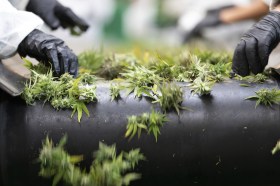COVID-19 drugs persist in wastewater, may pose risk to aquatic organisms

Treated wastewater effluent is sprayed at Penn State’s beneficial reuse site, the “Living Filter.” This diverts the wastewater from Spring Creek and allows the soil to act as a natural filter for any chemical residuals that remain in the wastewater.
Credit: Heather Preisendanz, Penn State
By International AffairsSeptember 9, 2022
Certain drugs used to treat COVID-19 patients—including remdesivir, dexamethasone and antibiotics for associated bacterial infections—persist through wastewater treatment and may occur in waterways at levels high enough to negatively affect aquatic organisms, according to a new study led by researchers at Penn State. The findings highlight the broad utility of wastewater surveillance as a tool for monitoring the effects of human health on water quality and ecosystem health.
According to Heather Preisendanz, associate professor of agricultural and biological engineering, Penn State, over-the counter and prescription-strength pharmaceuticals, including antibiotics and pain relievers, are excreted by humans, and many are known to persist through wastewater treatment plants and into nearby waterways, where they can negatively affect aquatic organisms.
“This knowledge spurred concerns that increased use of pharmaceuticals during the pandemic could also lead to increased concentrations of these drugs in wastewater treatment plant effluent and potentially harm aquatic life,” said Preisendanz.
The team—which included scientists from the U.S. Department of Agriculture—collected weekly influent (incoming) and effluent (outgoing) samples from two wastewater treatment plants in central Pennsylvania between May 2020 and May 2021. One of the sites includes a hospital in its service area.
The researchers analyzed the influent at both wastewater treatment plants for the virus SARS-CoV-2, as well as the influent and effluent for a variety of medications that may have been used to treat COVID-19. Their findings published in the Journal of Environmental Quality.
“People experiencing mild COVID-19 symptoms, but who are not severely ill to the point of needing hospitalization, have generally been recommended to treat their symptoms with pain relievers such as naproxen and acetaminophen,” said Preisendanz. “Meanwhile, antibiotics have been prescribed for patients who have COVID-19 complications leading to bacterial infections, and some hospitalized patients have been treated with remdesivir and dexamethasone.”
In their study, the researchers examined two over-the-counter fever reducer/pain relievers (acetaminophen and naproxen); five antibiotics (ampicillin, doxycycline, ofloxacin, sulfamethoxazole, and trimethoprim); two COVID-19 therapeutic agents (remdesivir and dexamethasone, which is used to reduce severe upper respiratory inflammation in patients on ventilators); and hydroxychloroquine, a malaria drug that was ultimately shown in clinical trials to be ineffective for treating COVID-19.

Credit: Heather Preisendanz, Penn State
“It’s possible that the detection of these pharmaceuticals may increase with increasing detection of SARS-CoV-2,” said Preisendanz. “By analyzing wastewater for SARS-CoV-2 and various medications, valuable information regarding the well-being of entire communities may be gained without the need to interview, survey or test individuals.”
The team found that remdesivir concentrations were correlated with the number of hospitalized COVID-19 patients, while dexamethasone concentrations were associated with the number of hospitalized patients on ventilators. Specifically, influent to the wastewater treatment plant servicing the hospital had concentrations of remdesivir and dexamethasone of 28% and 31%, respectively, while the average removal efficiencies by the wastewater treatment plant for these drugs were 39% and 56%, respectively. Hydroxychloroquine was not detected at any of the influent samples collected at either treatment plant.
“The virus concentrations, alone, couldn’t tell us whether we would see those medications; rather, it was really tied back to who was in the hospital and who was on ventilators,” said Preisendanz.
According to Preisendanz, although risk to aquatic organisms from remdesivir could not be calculated, as no research has yet been done to determine the concentrations that could pose a risk, dexamethasone was detected in quantities that could pose a low acute risk to fish.
Among the antibiotics tested, the team found that trimethoprim concentrations could pose a low-to-medium risk to aquatic life, while sulfamethoxazole could pose a high risk, specifically to algae, which is a food source for many organisms.
In addition, the team found that although acetaminophen and naproxen were present at concentrations much higher than all the other pharmaceuticals of interest, no correlations were observed between virus concentrations and influent concentrations of either drug, suggesting that they are not indicators of the prevalence of COVID-19 in the community. However, naproxen concentrations detected in effluent were at levels that could pose a low-to-medium risk to aquatic organisms.
“While the concentrations we calculated considered the individual risks that each drug could pose on aquatic life, these calculations do not account for the potential risks that could come from the synergistic effects of these drugs in a mixture, which could be much higher,” said Preisendanz. “Importantly, our study highlights the opportunity that wastewater surveillance provides to understand the effects of human health on water quality and ecological health.”
Emerging organic contaminant levels greatly influenced by stream flows, seasons
More information:
Kathryn R. Hayden et al, Impacts of the COVID‐19 pandemic on pharmaceuticals in wastewater treated for beneficial reuse: Two case studies in central Pennsylvania, Journal of Environmental Quality (2022). DOI: 10.1002/jeq2.20398
Provided by
Pennsylvania State University












